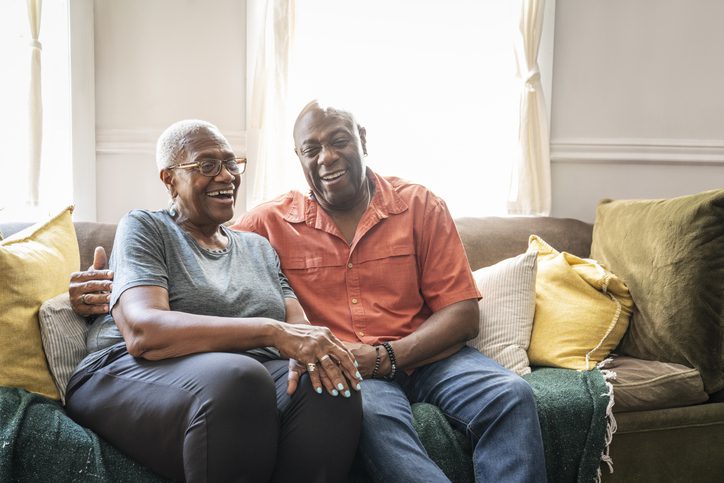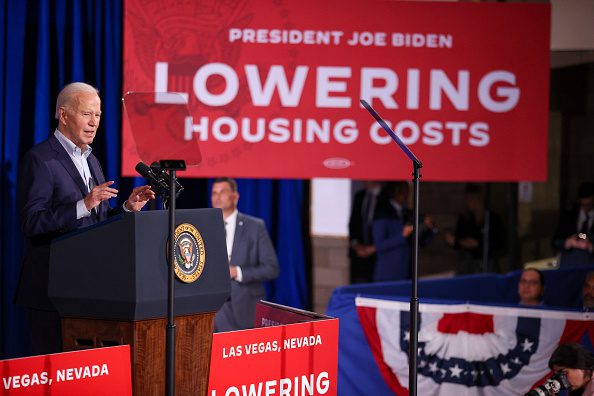
Photo Courtesy of Getty Images / JohnnyGreig
Vice President Kamala Harris helped get funding for more affordable senior and family housing in Nevada through the American Rescue Plan Act. She recently released policy plans to address the housing shortage with three million new homes and a $25,000 tax break to first-time home buyers.
Over the past four years, the Biden-Harris administration has provided more than $1 billion in support to Nevada to help build more affordable housing and keep homeowners and renters in their homes — including major investments in senior housing. Now, as she campaigns for president, Kamala Harris is promising to double down on those efforts and proposed plans to help more Nevadans become homeowners.
To address the nation’s housing crisis, Harris wants to build 3 million new homes by 2028, which would dramatically expand the housing supply for aspiring homebuyers. She’s proposed a three-prong plan in order to reach that goal: a $40 billion tax credit to make building new housing more economically practical for builders; expanding a credit which provides incentives for both state and local investment in housing; and streamlining the permitting and approval processes to ensure more homes get built.
“There’s a serious housing shortage in many places. It’s too difficult to build, and it’s driving prices up. As president, I will work in partnership with industry to build the housing we need, both to rent and to buy. We will take down barriers and cut red tape, including at the state and local levels,” Harris said in an August speech.
Harris has also vowed to create a plan to provide lower-income first-time homebuyers with up to $25,000 in down payment support in order “to help more Americans experience the pride of homeownership and the financial security that it represents and brings.”
Investing in affordable housing for Nevada
Harris, long a champion of housing rights as vice president, as Attorney General of California, and as a US Senator, touted the importance of addressing the housing crisis earlier this year.
“For people all across our nation, a home represents financial security, the opportunity to build wealth and equity, and a foundation for a better future for themselves, their children, and future generations,” Harris said. “[Federal funding] will build more affordable homes and support renters and homeowners while also lowering costs, building wealth, and creating jobs.”
The housing crisis especially remains a major issue in Nevada, with a shortage of over 78,000 homes for low-income renters, including seniors and working families. But the $1 billion in funding from the American Rescue Plan Act (ARPA) — which Harris cast the tie-breaking vote for in the US Senate — has provided a groundwork for Harris to build off of.
So far, $700 million of the $1 billion from the American Rescue Plan Act has been used to support affordable housing projects, with many specifically designed for vulnerable populations such as families and seniors. Nonprofits and other organizations interested in these critical funds were selected for grants by local governments. Eligible projects involve helping people suffering from homelessness, building new units, and preserving existing ones.
Many affordable housing projects are already underway and aim to be finished next year. Here are some highlights:
- 195 units for seniors in Paradise from Ovation Development.
- 195 units in Sun Valley from Ulysses Development Group.
- 171 units for seniors in Las Vegas from George Gekakis, Inc.
- 126 units in Carson City from Northern Nevada Community Housing Resource Board.
- 125 units for seniors in Las Vegas from Nevada HAND.
- A total of 1,000 new units for seniors in Clark County.
In initial 2021 hearings to decide how funds would be distributed in Nevada, Audra Hamernik, president of Nevada HAND – the state’s largest developer, builder, and manager of affordable rental homes for low-income seniors and working families — explained that ARPA funding would allow Nevada HAND to “move a lot faster” than usual.
“[This funding] is a gigantic opportunity to change the face of affordable housing in Southern Nevada,” she said.
Nevada HAND has since received $51 million to develop 565 units of housing.
Nevada residents have also benefited from ARPA by receiving direct aid for rental assistance or down-payments, cheaper health care premiums, lowered unemployment rate, and much more.
More information on local projects funded by ARPA can be found here.
Even more affordable housing in 2024
The Biden-Harris Administration announced more funding for local housing projects earlier this year, with Nevada receiving $43.9 million. These funds are being distributed through five different national programs targeting housing issues.
See a draft of the 2024 Nevada Action Plan for more details.

Corporate landlord agrees to refund renters $48 million after federal investigation
Corporate landlord agrees to refund renters $48 million after federal investigation Invitation Homes owns or manages roughly 3,500 units in Clark...

¿Qué cambios para la compra-venta de viviendas entrarán en efecto el 17 de agosto de 2024?
Esta información fue elaborada por Factchequeado, un medio de verificación que contrarresta la desinformación en Estados Unidos. Para el 17 de...

NV AG’s office says alleged apartment price-fixing is ‘on our radar’
BY: MICHAEL LYLE, Nevada Current The Nevada Attorney General’s Office said the real estate tech firm RealPage, which has faced accusations of...

Housing advocates try to prevent evictions, criticize Lombardo for 2023 vetoes
Nevada housing advocates called out Gov. Lombardo for vetoing bills last year that would have reformed the summary eviction system and protected the...

Rep. Susie Lee proposes ‘multi-pronged’ approach to address Nevada’s housing crisis
Coupled with coordination from stakeholders, as well as other proposed legislation, Lee believes her approach could provide critical relief for...

Rent increases would be limited to 5% per year under new Biden-Harris plan
The plan calls on Congress to pass a law that would withdraw tax credits from landlords who raise rent by more than 5% annually. If passed, the plan...


